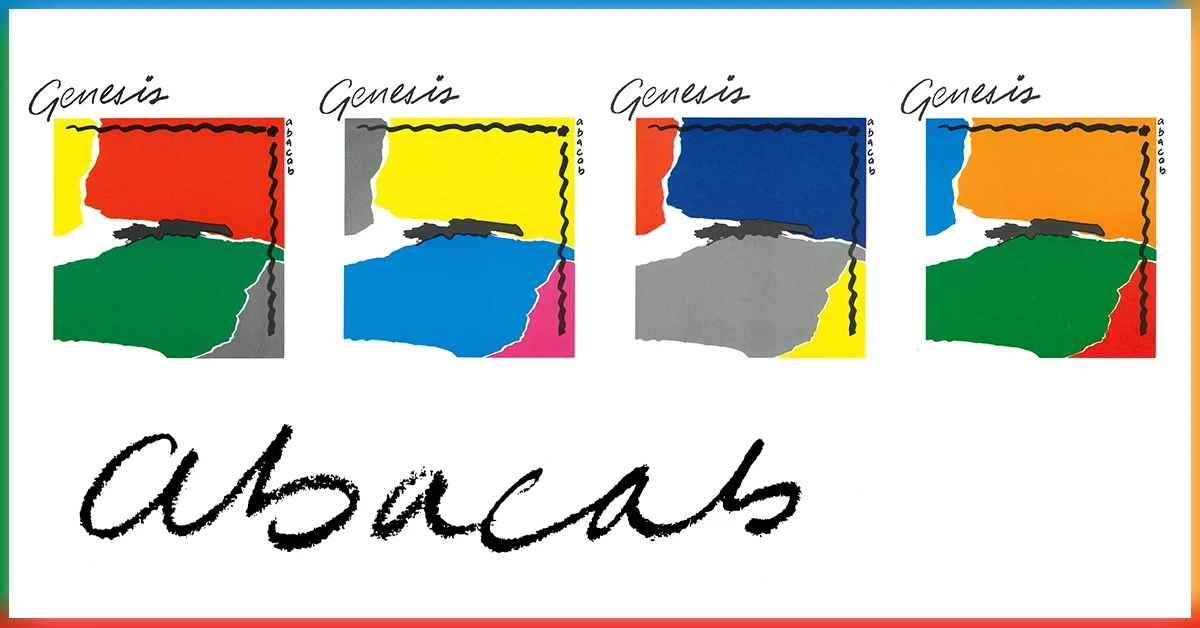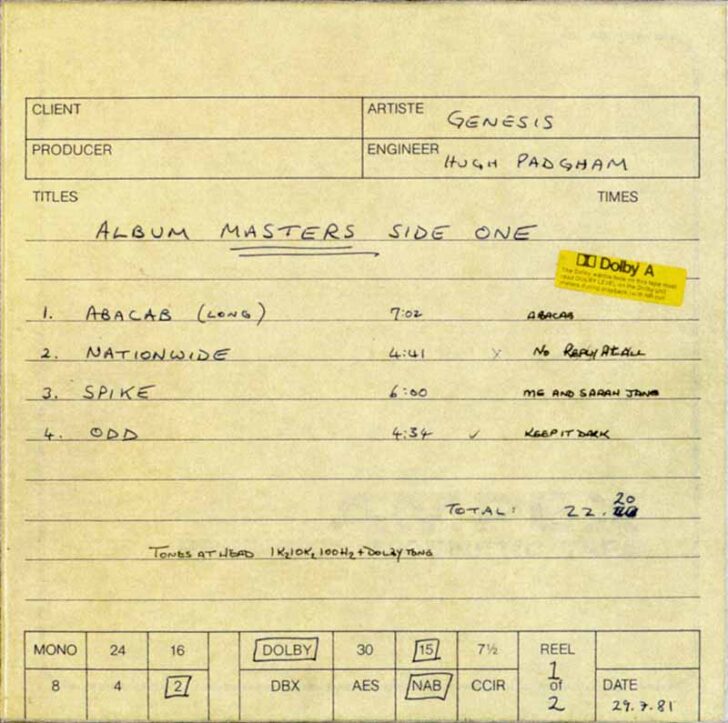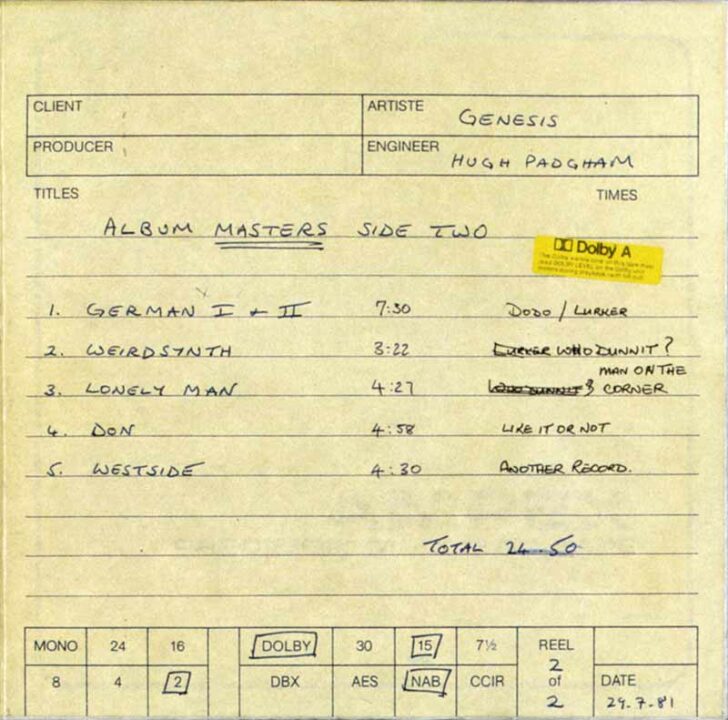- Article
- Read in 12 minutes
Genesis – Abacab – review
After the three members of Genesis all released their solo albums, they recorded Abacab, an album that would change everything…
Abacab is not just any old Genesis album. It destroyed much and opened many more doors. Even today many people are not entirely sure what it really is. Perhaps it is best described as an album that is remarkable, silly, chaotic, banal and sophisticated at the same time.
Genesis and their fans – that was always a story full of misconceptions from the first major change in the band’s lineup onwards. In 1975 Peter Gabriel, figurehead and perceived leader of the band, left Genesis. Nobody had expected and hardly anybody had hoped that Genesis would continue without their charismatic singer. But continue they did and Genesis became even more successful while maintaining the same artistic level. Though everything went well and Genesis made up with most of their fans the next bad surprise was just around the corner: Steve Hackett left. Steve, like Phil, had been a big influence on the sound of the band, and he had brought unforgettable solos to songs like Firth Of Fifth. As a songwriter he, like Phil Collins, barely registered. Steve’s departure marked the definite end of the band’s early years, and Seconds Out was seen as a turning point.
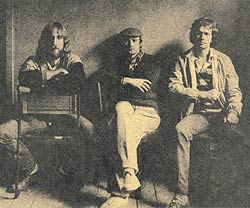
After Genesis recorded And Then There Were Three while they were trying to find their way as a band they published Duke, a decidedly progressive album, or at least one that contained elements of that genre in the Duke suite. Genesis had always been unpredictable in some ways – but the fact that they would still write something like the Duke suite in 1980 surprised many fans.
The departures of Peter Gabriel and particularly of Steve Hackett changed the band. One could say the band lost something each time. One could also say that the band dropped ballast and became more free. Duke was just the beginning and certainly not a clear indication of what was to come. By 1981 Genesis had become a different band for many reasons.
Tony Banks and Mike Rutherford became the creative core of the band, certainly since Anthony Phillips had left. In 1979 they each recorded a solo album, A Curious Feeling and Smallcreep’s Day. They found the time for it because Phil’s marriage fell apart due to their constant touring and he went to Vancouver to sort out his private life. Tony and Mike had found a release with these albums, and both records are still very popular with fans of the „old Genesis“. Phil Collins recorded his solo album Face Value after Duke.
It revolutionized pop music and had quite an impact on the 80s. A remarkable feat for a man who had only (co-)written a couple of songs here and there. While critics were praising Face Value and fans were buying it by the millions, the band had gone into their new studio at the Fisher Lane Farm to record a new album.
Many legends surround the Abacab sessions, but there are also a couple of reliable statements. Fact is Genesis recorded some music during their jam sessions which they scrapped because they felt they had done something like that before. That may have been the key to Abacab. The three of them had learnt a lot from their solo projects. Now they had the opportunity to translate the momentum they had gained from Duke into something altogether new.
Genesis talked about that in Chapter & Verse. Tony: „We tried to make our writing process … more straightforward. So we got rid of the big choruses and … the keyboard solos and aimed to hone everything down.“ Phil saw another aspect: From Duke on, he says, „we wrote more as a unit. On Abacab … we brought in one song each and after that there were no individual songs. This gave Genesis a genuine reason to carry on“ besides the solo careers. Phil enjoyed enormous success with Face Value, and In The Air Tonight was suddenly a Top 5 chart his, a thing Genesis had not achieved yet. Says Mike: „We were in the studio working with a new producer, … trying to develop a more pared-down, together sound. [In The Air Tonight and its big success] didn’t affect us.“
One dominant characteristic on Abacab is the drum sound. Phil took the sound he developed with Hugh Padgham on Peter Gabriel’s third album, used on the Padgham-produced Abacab and refined on Face Value, again with Padgham and brought it to the next level. „I wanted this strong, loud drumsound“, explains Padgham on previous Genesis documentaries, and continues: „Albums from the 70s often sound as if they had been recorded in a room with carpets on the walls, but it is hard if you stand next to a drummer because it gets really loud. That’s what I wanted to transport onto the LP.“ Padgham was a young man at the time, but his idea of a sound really left a mark on the way Genesis would sound. There was a huge difference in this regard between Duke and Abacab.
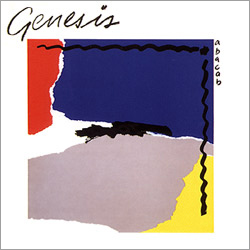
Cover designs were always very important. Paul Whitehead’s art covers from the 70s are hugely popular, but would have been out of place for Abacab. Abacab has an abstract, almost ugly cover. It came in four different colour schemes that were not available everywhere but mainly in the U.S. . Genesis purged not only their sound, but also the way they presented themselves. They felt ready to try something simpler. And so a couple of colour patches made up the Abacab cover – so simple that it id not leave any room for (mis)interpretations.
As far as the songs are concerned they have many different backgrounds:
Abacab
music + lyrics: Banks/Collins/Rutherford
The very title is peculiar. Genesis divided this song in different sections they designated A, B, and C. At one point in the production of this song these sections were ordered A-B-A-C-A-B, an order that Genesis did not use in the end, but it was the only version that could be pronounced. So they stuck with Abacab for the song and then decided to also use it for the album title. The song itself is a remarkable rock song that more or less uses classical structures such as verse – chorus – verse – chorus – bridge – chorus – verse – chorus – instrumental. The extended ending is a real highlight.
Genesis simply could not do without it. Mike Rutherford plays some very good guitar here. The definitive version of this song was played live on the Invisible Touch tour, where the instrumental section was extended, Mike’s guitar part longer and the drums very strong. A recording of this was released in 1992 on the Invisible Touch (live) maxi CD.
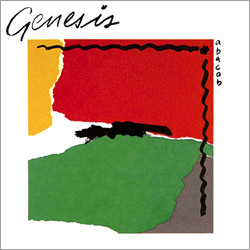
No Reply At All
music + lyrics: Banks/Collins/Rutherford
The first thing listeners will notice is that this song uses an element that can already be heard on Phil’s solo debut: a brass section. Looking back that may have been a wrong decision because it blurs the border between Collins solo and Genesis as a band. The song has that certain Genesis something, though, a playful quality, it is not so straightforward. It also has a poppier mood than the title song, almost too friendly for Genesis, one might say. No Reply At All became the second single from the album and quite a popular song in North America. The band found doing this song live a bit tricky because they had, of course, no brass section with them, so Daryl Stuermer would play the brass bits on the electric guitar.
Me And Sarah Jane
music + lyrics: Banks
It is immediately obvious who wrote this song. Me And Sarah Jane is one of three solo compositions on this album – and it is by Tony Banks. He remembers: „With Me and Sarah Jane I poured all this flowery stuff into one song, and reminded myself to keep it simple on the rest of the album […] It is probably my last Genesis song that had thousands of those chord changes.“ The use of a drum computer, a tool that worked for Duchess on Duke, gives Me And Sarah Jane a new flair compared to older songs. The drum computer is the dominant instrument in the intro, making it sound modern and shiny and new. The intricate song grows towards the end that becomes a typical grand Genesis finale – this is the place for romance…
Keep It Dark
music + lyrics: Banks/Collins/Rutherford
This is one of Tony Banks’ favourite songs on the album. Phil Collins described it as „Genesis punk“. The video is one of the more embarrassing moments for the band. The song itself is spectacularly unspectacular. A loop made of Mike’s guitar riff forms the body of the song. Note Phil playing the percussion and the lyrics: Someone is abducted by aliens, gets to see lots of fantastic things and cannot tell anybody about it in the end because no one would believe him anyway. That happens… years ago it was all fairy tales, Slippermen and Mad Man Moons, today it is simply shush.
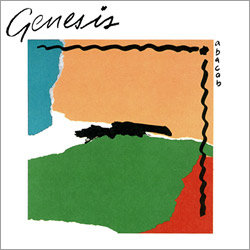
Dodo / Lurker
music + lyrics: Banks/Collins/Rutherford
The rule of thumb says every Genesis album has at least one long song. And it is true for almost every album. On Abacab the spot is taken by Dodo / Lurker, later simply called Dodo. If you survived Keep It Dark you will come to like Dodo. Collins sings in a much more abstract way than on the other songs, and there are a whole lot of musical layers for such a straightforward song. Dodo could be the prototype for Genesis in the 80s. It is unlike Me And Sarah Jane, more ironic, more subtle, it somehow does more justice to the thing.
Dodo is Abacab’s living room, all other songs are linked to this piece in one form or another. It is a signal to the fans: Look, in the past we wrote Firth Of Fifth, now we write Dodo – both pieces are Genesis, both are unique in their way, both are not pop and both are a matter of taste. “Dodo ugly, so dodo must die?” Not at all…
Who Dunnit?
music + lyrics: Banks/Collins/Rutherford
If there is one song that annoys fans of the 70s and leads to eruptions of anger it is Who Dunnit? Forget about the lyrics. This song is the very opposite of everything that made Genesis big. It is a radical cut, a provocation, a joke, a nuisance, a stroke of genius, a challenge. Who Dunnit? is not a song but an impudence. There was another song that could have taken the spot of Who Dunnit? on the album, and that is You Might Recall. It is popular with the fans, but ended up as a B-side and was released on Three Sides Live and later on Archive #2 and the bonus disc of the 1976-1982 box set.
It is thanks to Ahmet Ertegün, the late boss of Atlantic Records that Who Dunnit? was included on Abacab and You Might Recall was not. Ertegün had taken to the song and his instinct told him to promote the song, which may have been a wise decision. Whether you like Abacab or not, Who Dunnit? is the key to the album – a song that affirms Genesis were not going for a compromise and sticking to old structures. Genesis played this song even live, Mike Rutherford would play the drums and the band would wear silly hats. Audiences were divided. Fans of progressive music found that the song tried their patience. The 80s had begun, Genesis had become another band and if anybody needed any proof for that…
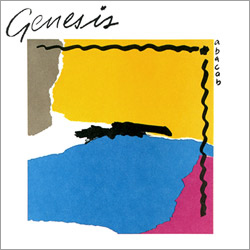
Man On The Corner
music + lyrics: Collins
The drum computer sets the mood for another solo composition. Man On The Corner was penned by Phil Collins. In the re-issue interview for Abacab Mike Rutherford remembers that this song was a nightmare live. “Everytime we played it live we had to pay absolute attention to keep the beat. When you know where ‘one’ is you are alright, but if you miss that moment it is a catastrophe. I remember many evil looks from Phil on stage when we played that song.” It is not a typical Collins song, so it is a legitimate Genesis song. Many consider Man On The Corner a hidden gem on the album.
Like It Or Not
music + lyrics: Rutherford
The history of Mike Rutherford writing songs about relationships is not much shorter than Phil Collins’. Phil caught up with him in 1981 with Face Value, but Mike had begun to write such songs much earlier, e.g. with Your Own Special Way. Like It Or Not is not even a ballad or an anthem but rather a moody “couldn’t care less” song. It suits Abacab, because the musical side is relaxed and dismissive whereas the lyrics are bitingly cynical. The music builds up in an exciting way and becomes classical Genesis again towards the end. This is not a big song. Or maybe it is because this song embodies the band’s new motto, a very serene attitude: Like it – or not…
Another Record
music + lyrics: Banks/Collins/Rutherford
An unobtrusive song brings up the rear end. It begins rather calm before it develops into a full-scale song. Genesis show their humour again: The request to “put another record on” does not sound too self-confident. After ten records and eight songs they have made it clear that they do not take themselves too seriously. Another Record is the perfect finale for an purposely imperfect record. It would have made a good ending for Genesis as a whole. In the end the song just puts the lid on an interesting experiment.
It was not just the album, its sound and the new songs that caused attention; the Abacab tour was similarly memorable. The band were almost booed off the stage in Leiden (NL) every time they played new material. Fans of the older records felt extremely sceptical towards the new songs to the point of rejecting them. Genesis had crossed a line. Abacab was their answer to punk. As opposed to other big rock bands they had survived it and survived in full glory.
There was a number of other songs that could have ended on Abacab. Me And Virgil probably lost the internal decision process against Dodo. Paperlate became a big hit and featured a brass group like No Reply At All. Last but not least there was You Might Recall that some consider the best piece from the Abacab sessions. But Genesis has other fish to fry. They did not want just a batch of good songs, they wanted structural unity. Abacab achieved it and that is its advantage over other records like Selling England By The Pound. One does not have to like that, but Genesis simply did their thing, damn the torpedoes, no safety-net, without any fear of failure. Duke had built the foundation for it, had brought back the self-confidence, the new studio and the solo efforts of the three musicians did the rest.
Abacab produced four singles. The title song became a hit on both sides of the Atlantic. No Reply At All enjoyed enormous airplay, Man On The Corner and Keep It Dark did not become smash hits but they were quite successful, too. All this showed: This band has a market.
Abacab was a brave project with an interesting result. Judging from today’s position it was vitally important for Genesis to turn away from the sounds and styles of the 70s – this change probably ensured their survival and rescued them from chronical boredom. Abacab is a fresh start. It is a rupture joint for the Genesis fans. If you can get into this album, you will enjoy it a lot. IAnd i you continue from here you will be able to discover many things regardless of whether you move forwards or backwards in time. If you don’t like it, you don’t like it. One fact remains: Genesis had never been as brave as they were on Abacab, and, more importantly, they never were again.
by Christian Gerhardts
translated by Martin Klinkhardt
… and, by the way, if you thought there are three different cover variations – think again. It’s actually seven! There are three further variations based on cassette releases in the UK, Germany/Canada and Argentina. Find out more in our forum in this thread and feel free to discuss Abacab there.

